2. Completed Activities
- Regular Courses
- Customized Course Programs (in Japan)
- Customized Course Programs Overseas
- Researcher Invitation Program
- Researcher Dispatch Program
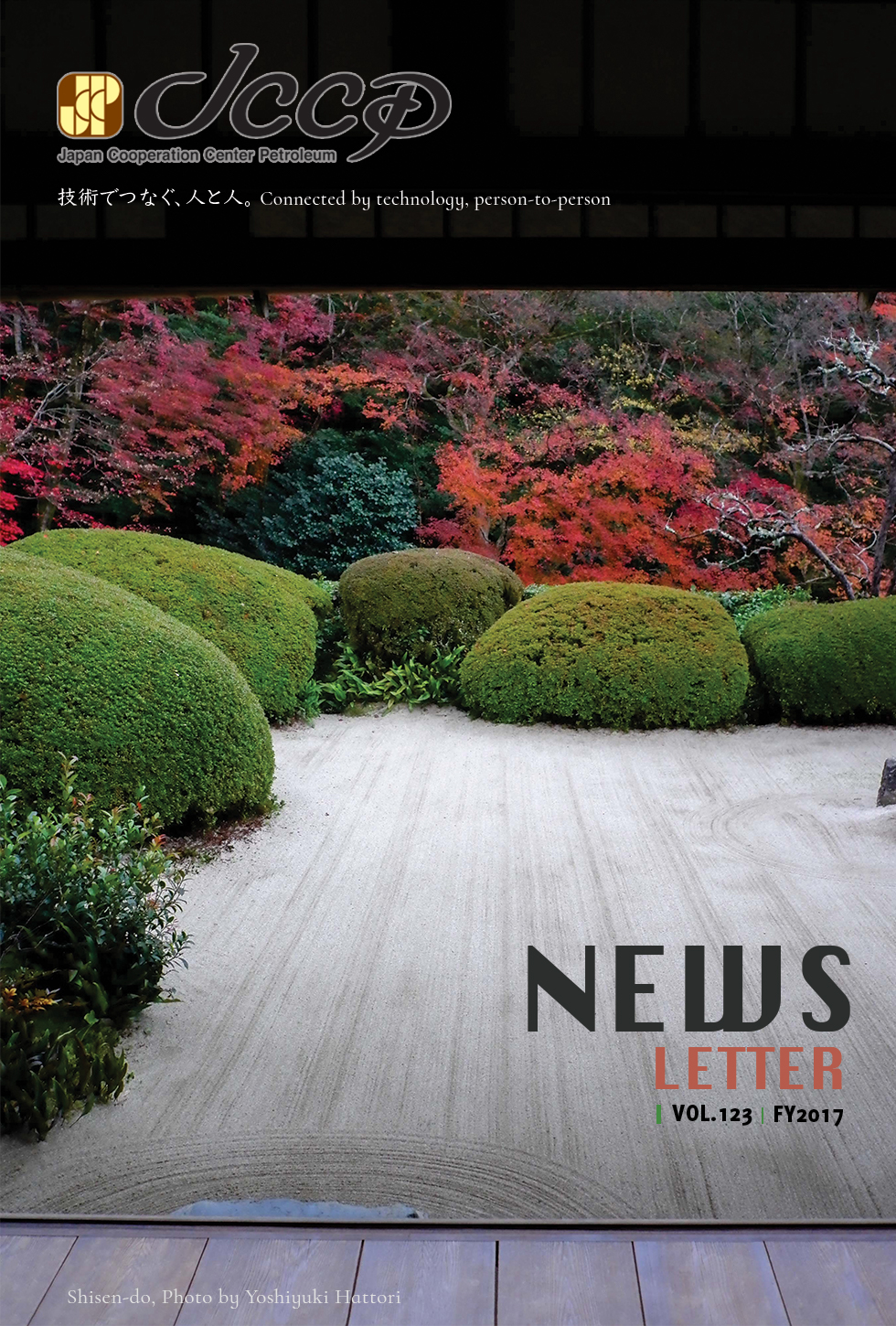
JCCP activities for fiscal 2017 were implemented as planned, and their initial quantitative goals were achieved despite the drastic 16% reduction in the budget for government subsidized businesses compared to the previous year.
The standing business implementation policy to contribute to ensuring a stable oil supply was augmented by the policy to provide support for product export expansion and overseas business expansion toward strengthening the competitiveness of Japan’s oil industry.
These policies were achieved in the form of increases in the numbers of training program participants and technical cooperation projects related to Southeast Asian countries that are the major destinations of overseas expansion by Japanese companies.
Initiatives were also taken to further expand and
gain greater recognition of JCCP’s activities.
These included a network conference (alumni meeting) of oil producing countries that was organized in Abu Dhabi, UAE with the objective of supporting oil infrastructure for which Japanese companies have gained extended rights , a training course for women’s career development that was held in UAE in response to a request from ADNOC, and the introduction of the case method approach and joint development of teaching materials with oil producing countries toward the enhancement of human resource development programs.
Furthermore, the 36th JCCP International Symposium was held in Tokyo and served as a forum for comprehensively verifying the evaluation of JCCP programs by oil producing countries.
The details of each program are presented below.
A total of 21 regular courses were implemented under the scheme for HRD programs in Japan conducted directly by JCCP. They consisted of 4 courses on strategic marketing and project management; 4 courses on human resources, financial accounting and distribution; 2 courses on the environment, new energies and energy conservation; 1 course on safety management; 3 courses on process and power generation technologies; 5 courses on maintenance; and 2 courses on instrumentation control.
Special programs on specific themes were also implemented in response to individual requests and needs from Middle East oil producing countries, countries in Southeast Asia, and oil-producing countries that are expected to be new sources of energy supply. In fiscal 2017, 6 such programs were held in Japan for Saudi Arabia, Qatar, UAE, Kuwait, Vietnam, Myanmar, etc., and 4 were held in UAE, Qatar, Indonesia, Myanmar, etc.
HRD programs in Japan conducted directly by JCCP and corporate HRD programs in Japan combined were attended by 455 participants. A breakdown of the number of participants to the former programs is as shown in the list of completed courses below. From fiscal 2014, strategic management courses for senior managers (executive candidates) have been offered for four consecutive years with favorable reviews. In fiscal 2017, two courses, namely a course for technical executive candidates (refinery and technology management) and a course for young technical leaders (planning and upgrading of new refineries), were newly implemented and met with good reviews.
Researcher invitation/dispatch programs mutually receive and dispatch researchers between oil/gas producing countries and Japan with the objective of developing researchers who engage in the development of advanced technologies that could be applied to the oil downstream sector in the future.
Under the fiscal 2017 researcher dispatch program, one researcher each was dispatched to Saudi Arabia (King Fahd University of Petroleum and Minerals) and Kuwait (Kuwait Institute for Scientific Research) for a total of three months, as the same as last year. Under the fiscal 2017 research invitation program, one researcher each from Saudi Arabia
(Saudi Aramco), UAE (ADNOC Refining Research Center), Iran (National Iranian Oil Refining and Distribution Company) and Vietnam (Vietnam Petroleum Institute) was received by research institutions in Japan, such as research laboratories of oil companies and universities, for periods of one to two months.
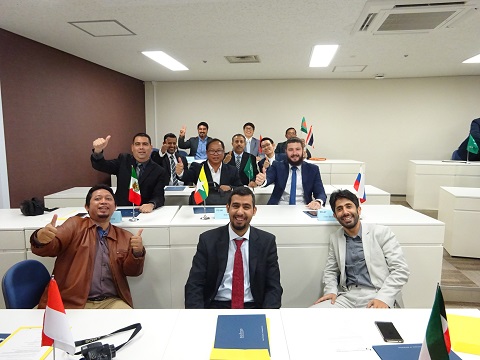
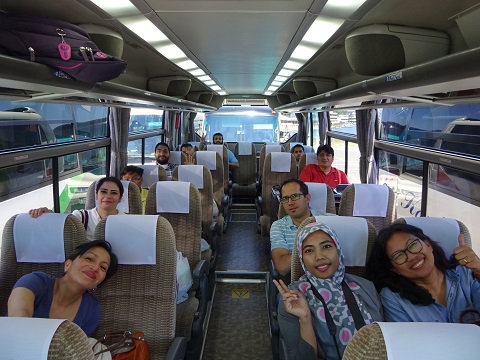
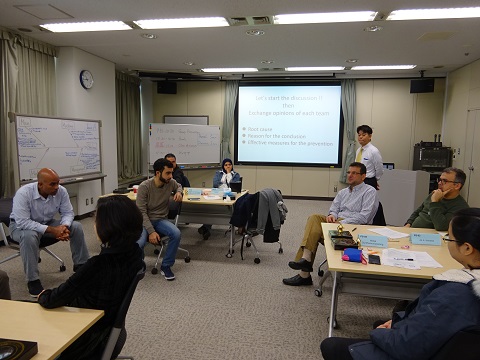
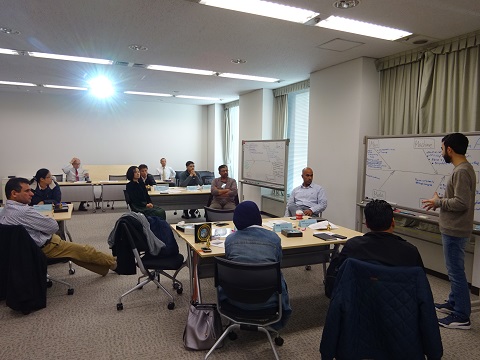
[Technical cooperation projects]
Technical cooperation projects are implemented to help solve technical issues that the oil downstream sector and other oil industry sectors face in oil/gas-producing countries, such as through the transfer of Japan’s technologies and expertise and the joint development of technologies with oil-producing countries. In fiscal 2017, technical cooperation projects were implemented in three stages while carefully verifying their appropriateness at each stage. The first stage consisted of 3 project finding surveys
(basic surveys) in three countries; the second stage, 8 feasibility studies (confirmation of project feasibility) in seven countries; and the third stage, the implementation of 19 projects in cooperation with eleven oil producing countries (joint projects).
With regard to these projects, it is worthy of note that five project implementation agreements were concluded and joint projects were begun, and that the percentage of projects in Asia increased from less than 20% to 30% as a result of the overseas expansion of Japan’s oil industry.
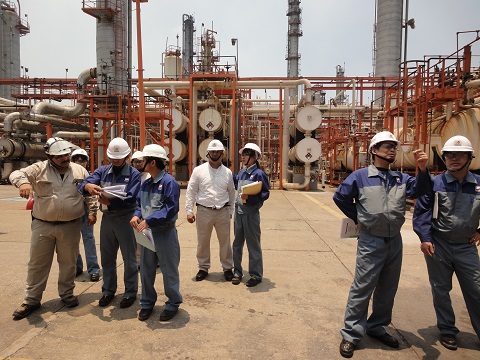
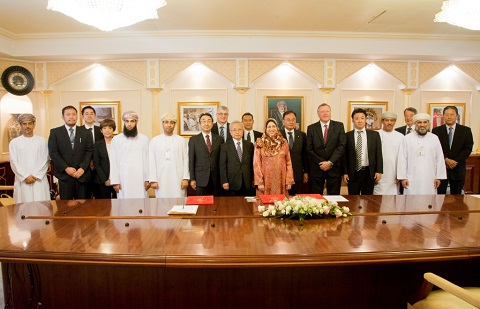
International cooperation programs aim to promote and strengthen information exchanges and personal relationships by holding various international conferences.
In January 2018, the 36th JCCP International Symposium
was held under the theme of “Progress of the Petroleum Industry Reforms: Challenges and the Future.” Sixteen keynote speakers and session speakers from oil/gas producing countries were invited to Japan and exchanged information with an audience of approximately 360 people.
Thematic joint symposiums are held at the request of a country or organization as a joint effort in Japan or the relevant country, with the objectives of widely disseminating Japan’s advanced technologies and research achievements and promoting information exchanges with the counterpart country.
In September 2017, Saudi Aramco and JCCP joint held a symposium in Tokyo under the theme of “The Global Perspective of the Hydrogen Economy.” Twenty-one speakers (including five from Saudi Aramco) and an audience of approximately 130 participants discussed and exchanged information on the overall status of initiatives for a hydrogen society, ranging from the production to transfer of hydrogen, including the CCS process, to hydrogen demand.
In November 2017, ADNOC and JCCP jointly held a workshop on water resources management in ADNOC’s SKEC Auditorium. Featuring 22 presentations that included nine speakers from Japan, an active exchange of information took place on such issues as water management, seawater desalination, wastewater treatment, water recycling and treatment of associated water, with the participation of an audience of approximately 100 people.
Also in November 2017, the 27th Saudi Arabia-Japan Joint Symposium was held under the theme of “Technology in Petroleum Refining & Petrochemicals” (joint sponsorship by Saudi Aramco, King Fahd University of Petroleum and Minerals (KFUPM), Japan Petroleum Institute (JPI) and JCCP) in an auditorium at KFUPM in Saudi Arabia. Featuring 20 presentations that included six speakers from Japan, an active exchange of views on various technologies was held with an audience of approximately 100 people. There were as many as seven female participants in the audience for the first time since the symposium was launched in 1992.
In February 2018, the 18th Kuwait-Japan Joint Symposium was held at the Petroleum Research Center of Kuwait Institute for Scientific Research (KISR), themed on “Advancement in Petroleum Industries ” (joint sponsorship of KISR, Kuwait National Petroleum Company (KNPC), Japan Petroleum Institute (JPI) and JCCP). Featuring 23 presentation with the participation of six speakers from Japan, an active exchange of views was held on various technologies with an audience of approximately 100 people.
In April 2017, the 5th Friendship Committee for Women Career Development (FCW) was held in Abu Dhabi. It featured panel discussions, workshops and reporting sessions with the participation of 12 female members from Japan and 15 from the Abu Dhabi National Oil Company Group.
Network conferences (alumni meetings) of oil producing countries are held by selecting a host country and widely inviting the attendance of people in the country who have participated in an HRD program or technical cooperation project. The conferences aim to enhance JCCP activities and to help maintain and strengthen personal relationships through active exchanges of views.
In October 2017, the 5th network conference (alumni meeting) of oil producing countries (third conference with Abu Dhabi) was held under the joint sponsorship of JOGMEC with the participation of more than 300 people, including some 200 alumni and concerned personnel from the counterpart country and Japan. The counterpart country took the occasion to express its appreciation of the programs and projects that have so far been implemented, and the two sides mutually confirmed the friendly relationship between the counterpart country and Japan.
Saudi Aramco-JCCP Joint Symposium
36th JCCP International Symposium
JCCP has overseas offices in al-Khobar, Saudi Arabia and Abu Dhabi, UAE. The al-Khobar office has transferred from its former location in Riyadh in March 2016.
Each office is in charge of a group of Middle East countries. The al-Khobar office is in charge of affairs in Saudi Arabia, Kuwait, Iraq and Bahrain, and the Abu Dhabi office is in charge of affairs in UAE, Qatar, Oman and Iran.
The principle roles of these overseas offices are to provide local support on projects being implemented in the countries that are under their charge and to collect relevant information about the countries.
The offices also utilize the network that JCCP has established since its founding with national oil companies and other such organizations in the Middle East oil-producing countries through the implementation of human resource development programs, technical cooperation projects and international cooperation activities, to support Japanese companies that do business or are planning to do business in the oil downstream sector in the Middle East oil-producing countries by assisting in their efforts to commence a new business or hold workshops toward establishing new relationships.
The al-Khobar office
The Middle East office
The al-Khobar office
The al-Khobar office
The Middle East office